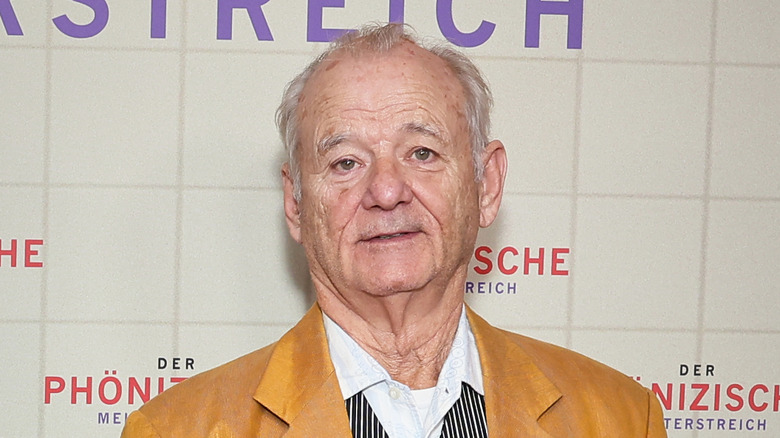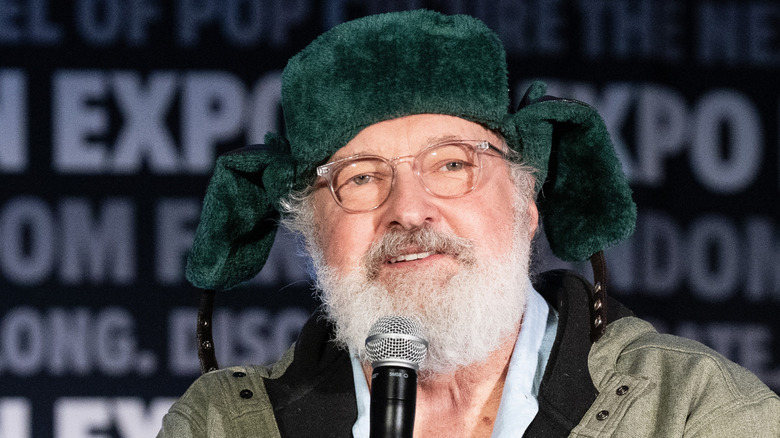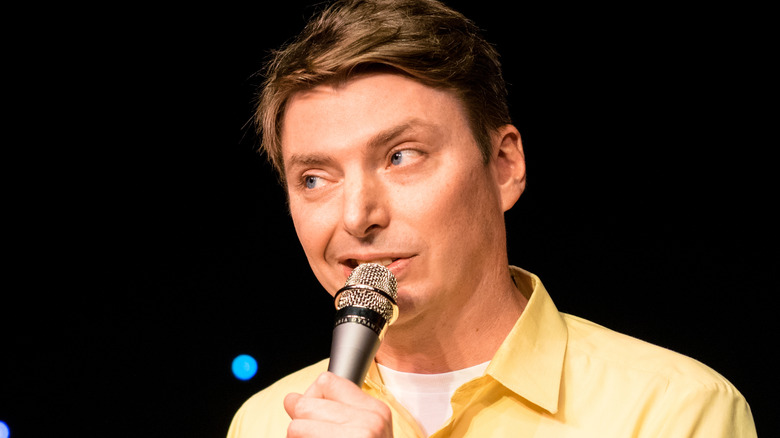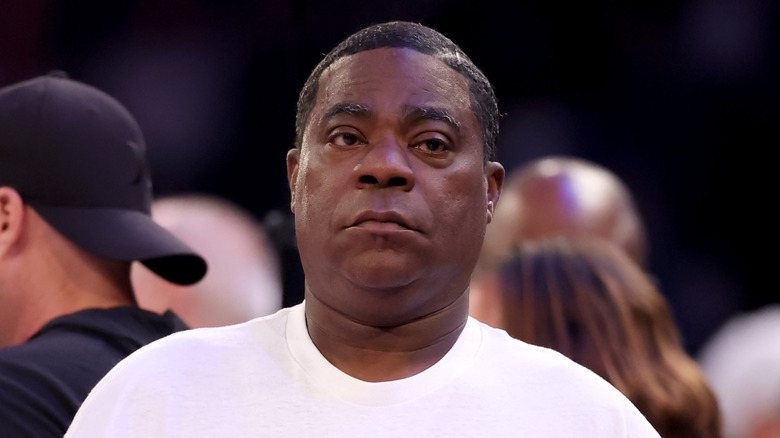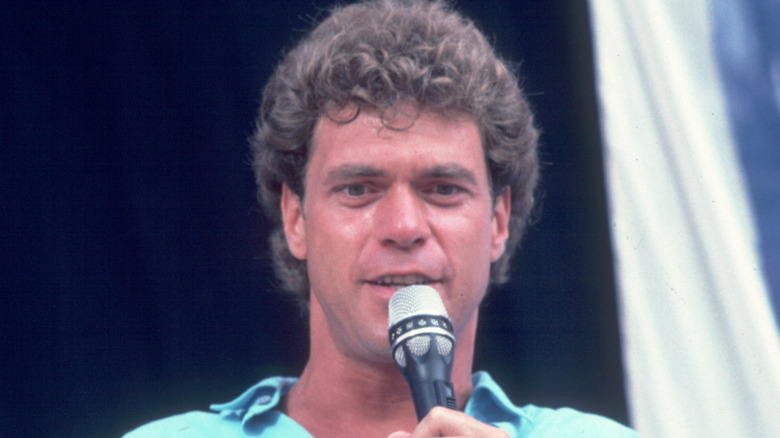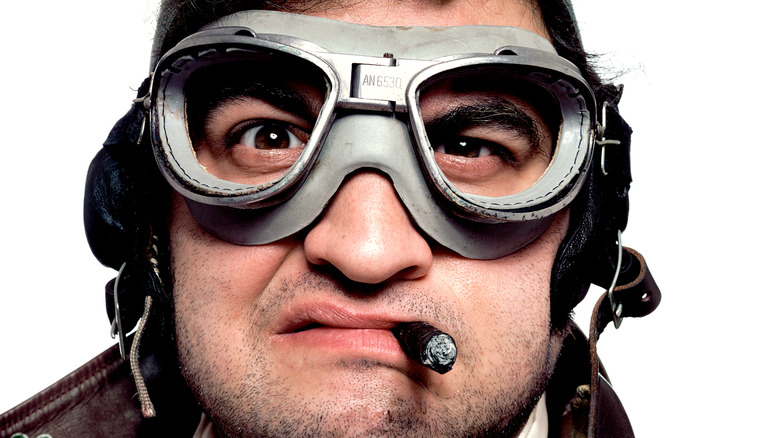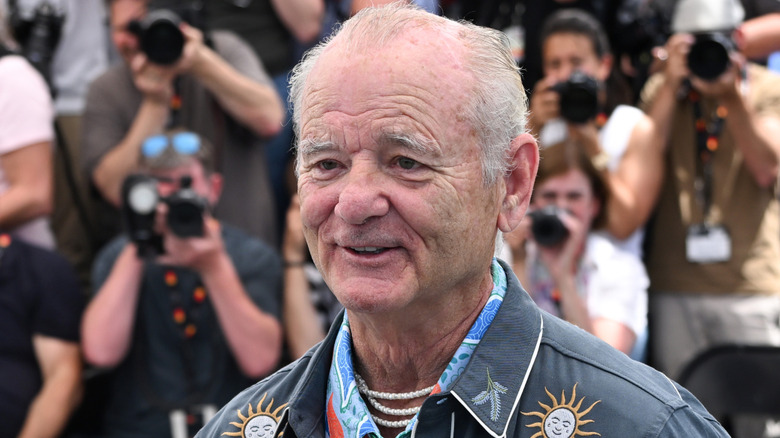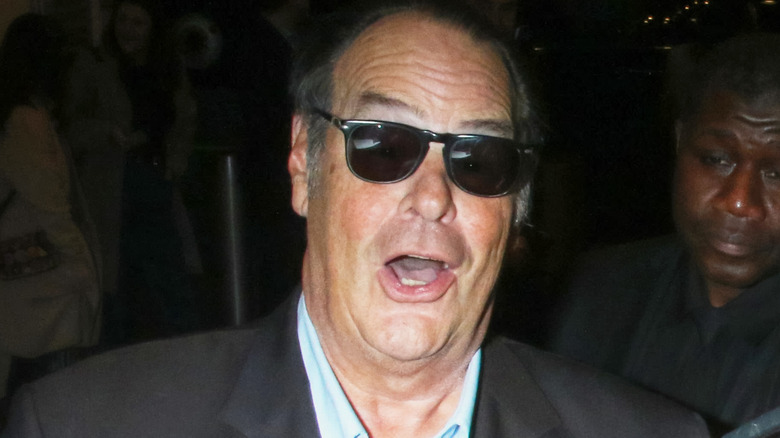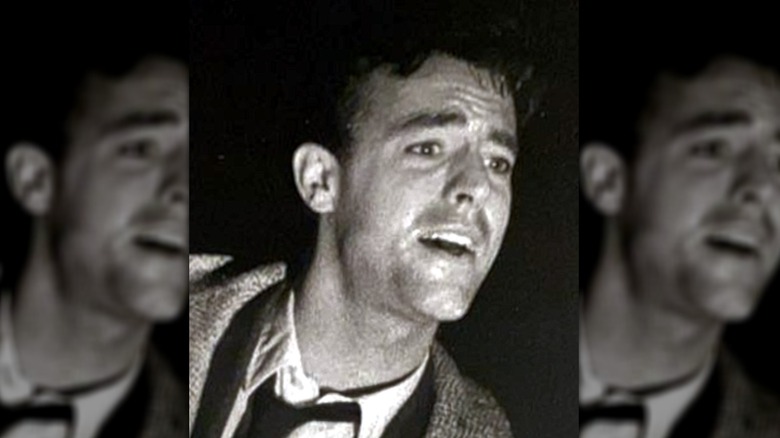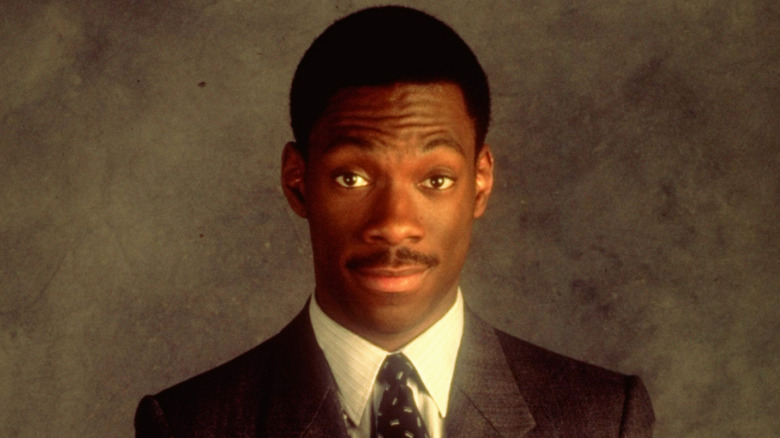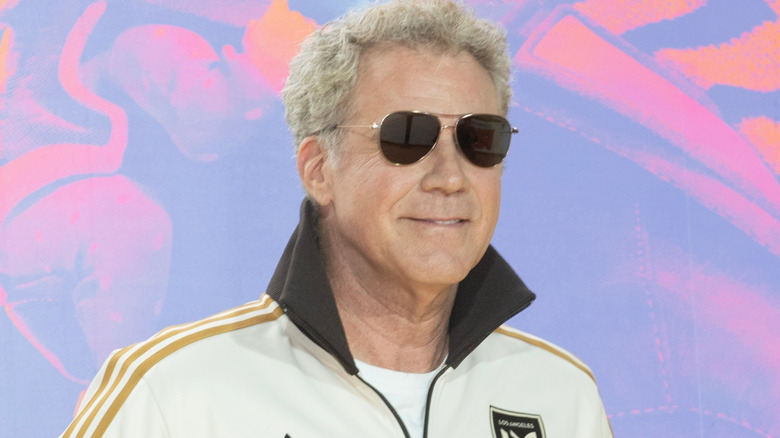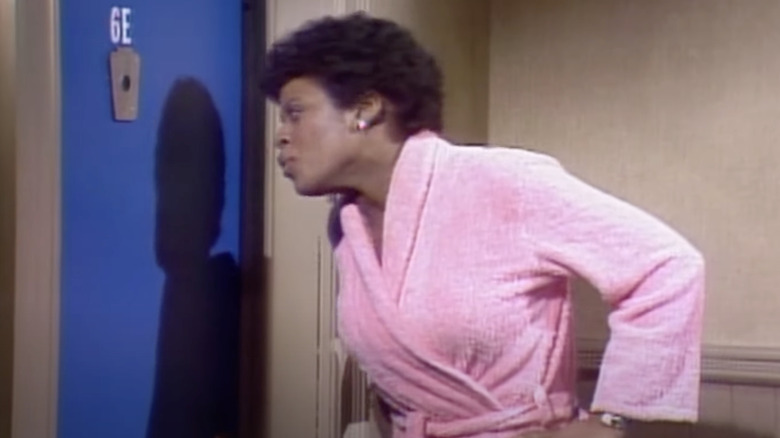SNL Stars Who Were Really Weird People
"Saturday Night Live" seems like the kind of workplace where being a bit off-kilter is both a requirement and a result. Since 1975, the pre-eminent American comedy show and late-night sketch program has served as an incubator for up-and-coming comics, actors, and screenwriters. Dozens of cast members who broke through in a big way at "Saturday Night Live" also went on to become major stars of film and television, after "SNL" prepared them for the grind of Hollywood.
It's a competitive environment, with large groups of performers striving to get noticed and be heard, doing whatever they can to get their material and faces on the air each week. Some "SNL" stars hated being on the show, while other cast members couldn't stand each other. But every last one of them was willing to go to extreme lengths to be funny and to serve the audience. Along with a thick skin, all of that takes a particular set of skills, as well as a certain psychology.
There are a lot of weird facts about "Saturday Night Live," and a lot of false facts about "SNL" that just aren't true. That's all strange, but perhaps there's nothing stranger than the people who have made all that classic comic television. Here are some instances of "SNL" stars who turned out to be at least a little bit off to the side from what could be considered "normal."
Randy Quaid
When "Saturday Night Live" creator Lorne Michaels returned to his show in 1985 after five years away, he brought in a brand-new cast. Breaking with "SNL" tradition of utilizing little-known comics, he stocked the show in part with a handful of established actors. Randy Quaid had already been nominated for an Academy Award (for "The Last Detail") and starred in hit movies like "Paper Moon" and "National Lampoon's Vacation" before he took a year off from film to make sketch comedy on late night TV.
Quaid went on to make memorable appearances in movies including "Days of Thunder," "Independence Day," and "Kingpin," before his career came to a sudden and curious halt. In 2010, the actor and his wife-manager, Evi, fled to Canada, purportedly because Quaid thought he was at risk for being murdered by a secret criminal organization he called "The Hollywood Star Whackers." But Quaid's disappearance more than likely had something to do with how police in Santa Barbara, California, had issued a felony arrest warrant after the couple had allegedly squatted in and then vandalized a guest house. When the Quaids returned to the U.S. in 2015, they were arrested at the border and then released.
Mike O'Brien
Mike O'Brien joined the "Saturday Night Live" writing staff in 2009, then added featured player to his duties for the fall of 2013, only to return to a primary writing role for a couple more years. He mainly appeared in short films he wrote and directed himself, generally odd, high-concept fare like "The Jay- Z Story" (a biopic in which O'Brien portrayed the rapper) and the surreal teen movie parody "Prom Queen."
One of O'Brien's most comically daring feats at "SNL" took place entirely off-screen. O'Brien spread a rumor amongst the show's cast and crew that he'd been taken out of the cast because showrunner Lorne Michaels had found out the performer had lied about his age. "He was mad that I was old and that he screamed, 'At least start f***ing acting and dressing young and get a f***ing nickname!'" O'Brien recalled on "The Lonely Island with Seth Meyers Podcast." O'Brien then spent an entire season working on "SNL" in character as an older adult pretending to be a younger adult, who went by the name Obi and dressed only in hip-hop-inspired clothing and a giant coat.
Tracy Morgan
Following his seven-year stint on "Saturday Night Live," where he portrayed characters like Astronaut Jones, nature host Brian Fellow, and unhoused man Woodrow, Tracy Morgan starred on "30 Rock," a network sitcom that ran for seven years and built up Morgan's fortune. In 2014, Morgan was riding in a vehicle when it was involved in a multi-car accident triggered by a Walmart truck that left him in a coma for weeks and gravely injured. He recovered, and was rumored to have taken home $90 million in a subsequent suit against Walmart.
Morgan poured his money into his house, a palatial mansion in New Jersey. While it's outfitted with the expected but no less impressive celebrity-favored accouterments like an indoor basketball court, bowling lane, and private movie theater, Morgan also paid for some furnishings found virtually nowhere else. Embedded in his pool table is an aquarium, home to a catfish and two exotic alligator gar specimens. He's also got a pet octopus, two stingrays, moray eels, and jellyfish in one of the largest private aquariums in the United States. In the backyard, there's a 20,000-gallon shark tank that's home to at least seven of the sea predators. Elsewhere in the house, Morgan installed a Benihana-level hibachi grill setup, where he hires employees from the chain to cook him dinner on occasion.
Joe Piscopo
A prominent member of the "Saturday Night Live" cast in the first decade of the 1980s, Joe Piscopo distinguished himself on the show with both celebrity impressions and original characters. Frequently paired with the program's other big presence at the time, Eddie Murphy, the pair played two old men named Solomon and Pudge, Frank Sinatra and Stevie Wonder, a pair of hairdressers, and Froggy and Buckwheat from "The Little Rascals."
Piscopo worked steadily after he exited "SNL" in 1984, starring in movies like "Johnny Dangerously" and performing his stand-up act live and on TV. That era of Piscopo's career coincided with rapid and significant physical changes: Piscopo went from a wiry, thin frame to being absolutely jacked. The gains began after Piscopo was diagnosed with thyroid cancer, leading to a major hormone imbalance. Then he started hitting the gym to build his muscles more, dealing with assumptions that he'd used performance-enhancing substances to get in the shape fans saw when he graced the cover of "Muscle and Fitness" in 1990. "No drugs. Never steroids. I am not a drug guy but the rumors are warranted," Piscopo told the New York Daily News in 2014. The comedian came to regret that phase of life. "What was I thinking?" he offered. "That was stupid. You don't do muscles and comedy — they don't mix."
John Belushi
Arguably the first true star of "Saturday Night Live," John Belushi pulled in viewers who wanted to see his over-the-top comedy stylings during the first few years of the show. Whether he was imitating the herky-jerky movements of Joe Cocker, mashing up Beethoven and Ray Charles, working the grill in a chaotic Greek diner, or performing as one-half of the Blues Brothers, Belushi always brought lots of energy to his roles. Throughout his adult life, Belushi was also a voracious user of drugs, particularly cocaine; he died of an overdose in 1982.
While filming the 1980 spinoff movie "The Blues Brothers," Belushi vanished. This wasn't a terribly new phenomenon for the star, who, whether or not he was inebriated, followed his appetites, muses, and passions, and that included wandering away from work. It was about 3 a.m. when cast members noticed Belushi's absence from the set built in Harvey, Illinois. His close friend, frequent collaborator, and co-star Dan Aykroyd led the hunt, noticing a path leading out from the lot to one home with its lights on, where he approached the resident and asked if the actor was inside. Belushi had evidently helped himself to the contents of the refrigerator and then fallen asleep on the couch. Whenever this happened, Aykroyd utilized his nickname for Belushi: "America's Guest."
Bill Murray
If unpredictable and spontaneous can be considered synonymous with weird, then Bill Murray is an all-time weirdo. He was only a regular member of the cast for less than four years, 1977 to 1980, but that's where Murray established the smirking, aloof, self-aggrandizing persona he's used for many of his movie and TV characters, and for conducting his personal affairs. For example, Murray eschews the Hollywood industry standard and doesn't regularly employ an agent or a manager; if filmmakers want him for their project, they can leave a message for him on a secret 1-800 number, and he might return their call.
In the 2000s and 2010s, internet denizens traded "Bill Murray stories." Reading like urban legends, people documented their unique encounters with Murray, which went down in cities all over the world. Whether he's crashed a wedding, attended a college party where he didn't know anyone, or dined with a stranger at a Thai restaurant in Germany, Murray is apparently always up for an adventure. He's also aware of how preposterous and unbelievable these stories can sound. Often, those Bill Murray stories include the "SNL" veteran remarking, "No one will ever believe you."
Dan Aykroyd
Original "Saturday Night Live" cast member Dan Aykroyd is equally famous for 1984's "Ghostbusters." Aykroyd co-wrote the script, fueled by his belief in the existence of otherworldly creatures. "There's a book called 'History of Ghosts.' My dad wrote it," Aykroyd told The Globe and Mail. His father worked with a collective that explored strange phenomena like levitation and ectoplasm, and Aykroyd took it from there. "They passed it on to me and then I took it and turned it [into] a lucid exploitation of it with 'Ghostbusters.'"
Aykroyd also worked on the Travel Channel show "Hotel Paranormal," which explores human accounts of contact with the inexplainable. "There are events that really actually happened to these people, traumatized them in many cases, scared them," Aykroyd told Yahoo! Entertainment. "There's a vivid evidence of the fact that there is survival of life and consciousness after death."
The actor reports encountering spooky entities on multiple occasions. He claims to have seen his wife's jewelry move and fly, and also to have slept by a spirit in a Hollywood Hills house where he once lived. "Something got into bed with me one night, I believe, when I was alone there," Aykroyd remembered. "And I felt a chill and then I felt something compress next to me on the mattress. And what am I gonna do? I'm tired, I'd just come from work. There's no one there. So I just snuggled up next to it and I went to sleep."
Peter Aykroyd
By 1980, most of the original, groundbreaking, and perennially popular cast of "Saturday Night Live" had left the show to pursue other opportunities. Creator and producer Lorne Michaels left too, and Jean Doumanian's brief and tumultuous takeover of "SNL" began. Doumanian brought in many new stars, including one with some name recognition: Peter Aykroyd, the younger brother of the just-departed Dan Aykroyd. A featured player and writer, the lesser-known Aykroyd toiled at "SNL" for just one season.
One of the "SNL" stars who then disappeared, Aykroyd's later work in film and television was conducted in tandem with his brother. After co-writing the 1991 comedy "Nothing But Trouble," Peter Aykroyd helped create and executive produce the 1996 to 2000 TV series "PSI Factor: Chronicles of the Paranormal." Similar to "The X-Files," the show depicted the Office of Scientific Investigation and Research looking into ghost and alien sightings. A concept about which Aykroyd felt passionate — he had a family history of ghost communication experiments — he tried to get a talk show going in 2002 called "Dan Aykroyd's Out There." A great many episodes were supposedly filmed at the behest of the Sci-Fi Channel, which never aired the series that featured Dan Aykroyd interviewing people about their paranormal experiences. Peter Aykroyd died in 2021 after he suffered an infection related to a hernia issue he'd been diagnosed with, but never addressed, three decades prior.
Eddie Murphy
Eddie Murphy joined "Saturday Night Live" in 1980 at age 19, and he almost instantly became the biggest figure in his era of the show. He behaved in a way that was called arrogant or cocky, but it was earned, churning out classic bits such as "James Brown's Celebrity Hot Tub Party" and "Mr. Robinson's Neighborhood."
As he became an A-list movie star, Murphy kept up the confidence, inspired by one of his role models. "Elvis Presley to me, it's his presence, I think it is. I don't think anyone in this business has had as much presence as Elvis," he once explained on "The Arsenio Hall Show." "He was going through all this stuff with drugs and all this craziness but on screen and on stage he always looked like he was in control. Not only an admirer of the "King of Rock 'n' Roll," Murphy was also a collector, and at one point he'd amassed one of the largest known collections of Elvis memorabilia.
But then, one day, Murphy realized his appreciation for Presley had faded somewhat, and that he no longer wanted nor understood why he had all of those expensive mementos. "I still love Elvis, he was much cooler when I was younger. But I got older, and you start to see the whole picture," Murphy said on "The Tonight Show Starring Jimmy Fallon" in 2019. "It was like, 'Hey man, take that s*** off the wall.' I had that jumpsuit on my wall."
Will Ferrell
Will Ferrell jumped right from his seven-year tenure on "Saturday Night Live" to starring in movies like "Old School," "Anchorman," and "Step Brothers." Ferrell doesn't always make comedy in the traditional way, however. Sometimes he doesn't want to wait for a film shoot to get underway, so he'll make his own funny stuff out in the real world, and in a manner more befitting of an experimental comedian or a performance artist.
In 2011, Ferrell wanted to make commercials for Old Milwaukee, a once widely consumed but recently more obscure beer brand. With the blessing of manufacturer Pabst Brewing Company, Ferrell self-funded and starred in the low-budget spots, taped and aired in the almost random locale of Davenport, Iowa. In one ad, Ferrell fished; in another, he delivered a half-hearted poem about beer. Then Ferrell bought ad time for his Old Milwaukee ads to air during the Super Bowl, but only in the very small TV market of North Platte, Nebraska.
After he was gifted a security guard uniform, Ferrell put it on and wore it to a Los Angeles Lakers game at Staples Center. He conducted himself like a real guard, going so far as to remove retired basketball star Shaquille O'Neal from the arena. Then in 2022, Ferrell took the floor for warm-ups at a Golden State Warriors game in the costume of Jackie Moon, the character he played in the 2008 basketball comedy "Semi-Pro."
Yvonne Hudson
It's perfectly normal to make it onto "Saturday Night Live" after many years of career building and lead-up, which makes the way Yvonne Hudson became an "SNL" cast member so rare and fascinating. In the early years of the sketch show, Hudson worked for NBC, serving as the receptionist for "Saturday Night Live" at 30 Rockefeller Center in New York. In 1978, she was first enlisted to play small, nonspeaking roles, and for the next two years, Hudson would pop up as an uncredited extra in the occasional "SNL" episode, rarely even speaking, while maintaining her front desk duties.
In 1980, Hudson officially joined the "SNL" talent pool, named a featured player. The first Black woman ever in the show's cast, she popped up in sketches with lines, but very rarely starred in bits. At season's end, she went back to being an extra on an as-needed basis. After departing "SNL" in 1984, Hudson served as a crew member on a 1985 Motown Records special, then left the entertainment industry and vanished from the public eye. Almost nothing is known about her subsequent whereabouts.
